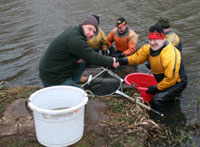Environment Agency Fisheries Officers have been overseeing the successful movement of a hundred pounds of roach and bream from Wedgwoods Main Lake to restock the Top Lake in Stoke on Trent, in freezing conditions.
The fish were moved by members of the Stoke on Trent Angling Society Fisheries Management Team, who have many years of experience in netting operations.
It was not a straightforward operation because the Main Lake also contains bitterling, which are not native to England and are subject to restrictions under the Importation of Live Fish Act (ILFA) 1980.
Any bitterling caught must be removed from the lake, so all the fish caught had to be painstakingly graded. Ninety bitterling were sent to the Environment Agency’s National Fisheries Laboratory at Brampton.
Bitterling are found in France and may have been released into the wild after being kept as pets in fish tanks or garden ponds. They pose a threat to native fish where large populations have direct competition for food but may also carry non-native parasites. They grow to about 80mm in size and live for 5 years. They have an unusual life cycle as they need swan mussels to breed. The female lays her eggs in live swan mussels. The male then fertilises the eggs and guards them until they hatch.
Fisheries Officer, Mick Buxton says “Non-native fish such as bitterling can spread diseases and parasites that our native fish have little or no resistance to, so it is very important not to put fish from a fish tank or garden pond into the wild. All fish movements require a formal consent from us. It is an important part of our job to audit them to ensure that there is no risk to the environment.”
Any movements of fish between watercourses needs Environment Agency consent. This is a legal requirement under section 30 of the Salmon and Freshwater Fisheries Act 1975 and is very important to reduce the risk of spreading disease, parasites and non-indigenous fish species that may be harmful to local eco-systems. Part of a Fisheries Officer’s job is to audit such movements of fish to ensure they are carried out safely.






